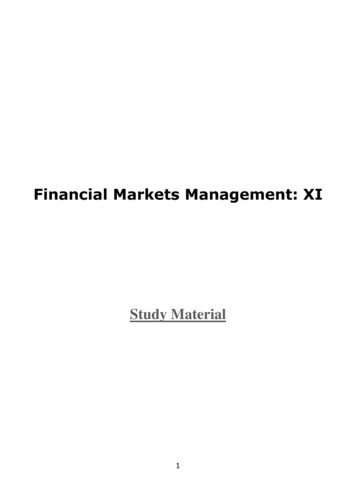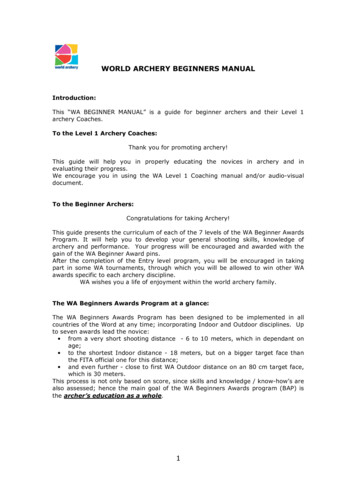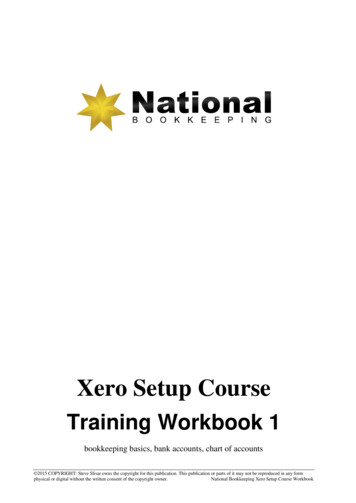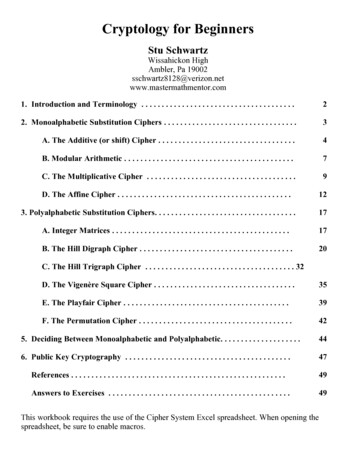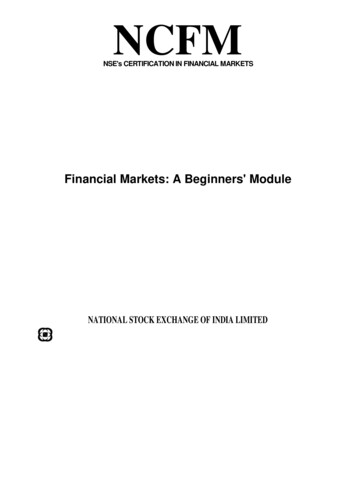
Transcription
NCFMNSE's CERTIFICATION IN FINANCIAL MARKETSFinancial Markets: A Beginners' ModuleNATIONAL STOCK EXCHANGE OF INDIA LIMITED
Test 02250225015002000 10014060 5050100100100100755055555550NA222NASr.No.Name of 2012015001500150015001500150010003334Financial Markets: A Beginners' Module *Mutual Funds : A Beginners' ModuleCurrency Derivatives: A Beginner's ModuleEquity Derivatives: A Beginner's ModuleInterest Rate Derivatives: A Beginner's ModuleCommercial Banking in India: A Beginner's ModuleSecurities Market (Basic) ModuleCapital Market (Dealers) Module *Derivatives Market (Dealers) Module *FIMMDA-NSE Debt Market (Basic) ModuleInvestment Analysis and PortfolioManagement ModuleFundamental Analysis ModuleSecurities Market (Advanced) ModuleMutual Fund (Advanced) ModuleBanking Sector ModuleInsurance ModuleMacroeconomics for Financial Markets ModuleNISM-Series-I: Currency Derivatives CertificationExaminationNISM-Series-II-A: Registrars to an Issue andShare Transfer Agents - CorporateCertification ExaminationNISM-Series-II-B: Registrars to an Issue andShare Transfer Agents - Mutual FundCertification ExaminationNISM-Series-IV: Interest RateDerivatives Certification ExaminationNISM-Series-V-A: Mutual FundDistributors Certification Examination *NISM-Series-VI: Depository OperationsCertification ExaminationNISM Series VII: Securities Operations andRisk Management Certification ExaminationCertified Personal Financial Advisor(CPFA) ExaminationNSDL-Depository Operations ModuleCommodities Market ModuleSurveillance in Stock Exchanges ModuleCorporate Governance ModuleCompliance Officers (Brokers) ModuleCompliance Officers (Corporates) ModuleInformation Security Auditors Module (Part-1)Information Security Auditors Module (Part-2)Options Trading Strategies ModuleFPSB India Exam 1 to 4**3536373839Examination 5/Advanced Financial Planning **Equity Research Module ##Issue Management Module ##Market Risk Module ##Financial Modeling Module ###121314151617181920212223242526272829303132Test DurationNo. of(in minutes) QuestionsCandidates have the option to take the tests in English, Gujarati or Hindi languages.Candidates securing 80% or more marks in NSDL-Depository Operations Module ONLY will be certified as 'Trainers'.Following are the modules of Financial Planning Standards Board India (Certified Financial Planner Certification)FPSB India Exam 1 to 4 i.e. (i) Risk Analysis & Insurance Planning (ii) Retirement Planning & Employee Benefits(iii) Investment Planning and (iv) Tax Planning & Estate PlanningExamination 5/Advanced Financial Planning ##Modules of Finitiatives Learning India Pvt. Ltd. (FLIP) ### Module ofIMS PreschoolThe curriculum for each of the modules (except Modules of Financial Planning Standards Board India, Finitiatives Learning India Pvt. Ltd. andIMS Proschool) is available on our website: www.nseindia.com Education Certifications.*#**
PrefaceThe National Stock Exchange of India Ltd. (NSE), set up in the year 1993, istoday the largest stock exchange in India and a preferred exchange for trading inequity, debt and derivatives instruments by investors. NSE has set up a sophisticatedelectronic trading, clearing and settlement platform and its infrastructure serves as arole model for the securities industry. The standards set by NSE in terms of marketpractices; products and technology have become industry benchmarks and are beingreplicated by many other market participants. It provides a screen-based automatedtrading system with a high degree of transparency and equal access to investorsirrespective of geographical location. The high level of information disseminationthrough the on-line system has helped in integrating retail investors across thenation. The exchange has a network in more than 350 cities and its trading membersare connected to the centralservers of the exchangeinMumbai throughasophisticated telecommunication network comprising of over 2500 VSATs. NSE hasaround 850 trading members and provides trading in over2500 debt securities.Besides this,NSE provides trading1000 equity shares andin various derivativeproducts such as index futures, index options, stock futures, stock options andinterest rate futures.At NSE, it has always been our endeavour to continuously upgrade the skills andproficiency of the Indian investor. Since, financially literate investors are thebackbone of the securities market, knowledge and awareness about the securitiesmarket is of the foremost concern to us, starting with the most basic of informationbeing made available as the first step.This booklet has therefore been prepared for those of you who are keen to acquiresome basic but key information about the stock markets as an initial step towardsbecoming a more informed investor. We hope this booklet will act as a means ofsatisfying some of your initial queries on the stock markets.
CONTENTSINVESTMENT BASICS.1.6What is Investment? . 6Why should one invest?. 6When to start Investing? . 6What care should one take while investing? . 7What is meant by Interest?. 7What factors determine interest rates? . 7What are various options available for investment?. 8What are various Short-term financial options available for investment?. 8What are various Long-term financial options available for investment? . 9What is meant by a Stock Exchange? . 10What is an „Equity'/Share? . 10What is a „Debt Instrument'? . 11What is a Derivative? . 11What is a Mutual Fund? . 11What is an Index? . 12What is a Depository? . 12What is Dematerialization? . 122.SECURITIES 13What is meant by „Securities‟? . 13What is the function of Securities Market? . 13Which are the securities one can invest in? . 132.1REGULATOR . 14Why does Securities Market need Regulators? . 14Who regulates the Securities Market? . 14What is SEBI and what is its role? . 142.2 PARTICIPANTS . 15Who are the participants in the Securities Market? . 15Is it necessary to transact through an intermediary? . 15What are the segments of Securities Market? . 153. PRIMARY MARKET 16What is the role of the „Primary Market‟?. 16What is meant by Face Value of a share/debenture? . 16What do you mean by the term Premium and Discount in a Security Market?.163.1ISSUE OF SHARES . 17Why do companies need to issue shares to the public? . 17What are the different kinds of issues? . 17What is meant by Issue price? . 18What is meant by Market Capitalisation? . 18What is the difference between public issue and private placement? . 19What is an Initial Public Offer (IPO)? . 191
Who decides the price of an issue? . 19What does „price discovery through Book Building Process‟ mean? . 19What is the main difference between offer of shares through book building andoffer of shares through normal public issue?. 20What is Cut-Off Price? . 20What is the floor price in case of book building? . 20What is a Price Band in a book built IPO? . 20Who decides the Price Band? . 21What is minimum number of days for which a bid should remain open duringbook building? . 21Can open outcry system be used for book building? . 21Can the individual investor use the book building facility to make anapplication?. 21How does one know if shares are allotted in an IPO/offer for sale? What is thetimeframe for getting refund if shares not allotted? . 21How long does it take to get the shares listed after issue? . 21What is the role of a „Registrar‟ to an issue? . 22Does NSE provide any facility for IPO? . 22What is a Prospectus? . 22What does „Draft Offer document‟ mean? . 23What is an „Abridged Prospectus‟? . 23Who prepares the „Prospectus Offer Documents‟?. 23What does one mean by „Lock-in‟? . 24What is meant by „Listing of Securities‟? . 24What is a „Listing Agreement‟? . 24What does „Delisting of securities‟ mean? . 24What is SEBI's Role in an Issue? . 24Does it mean that SEBI recommends an issue? . 25Does SEBI tag make one‟s money safe? . 253.2FOREIGN CAPITAL ISSUANCE . 25Can companies in India raise foreign currency resources? . 25What is an American Depository Receipt? . 25What is an ADS?. 26What is meant by Global Depository Receipts? . 264.SECONDARY MARKET 274.1INTRODUCTION . 27What is meant by Secondary market? . 27What is the role of the Secondary Market? . 27What is the difference between the Primary Market and the Secondary Market?. 274.1.1 Stock Exchange . 28What is the role of a Stock Exchange in buying and selling shares? . 28What is Demutualisation of stock exchanges? . 28How is a demutualised exchange different from a mutual exchange? . 284.1.2 Stock Trading . 29What is Screen Based Trading? . 29What is NEAT? . 29How to place orders with the broker? . 292
How does an investor get access to internet based trading facility? . 29What is a Contract Note? . 30What details are required to be mentioned on the contract note issued by thestock broker? . 30What is the maximum brokerage that a broker can charge? . 30Why should one trade on a recognized stock exchange only for buying/sellingshares? . 31How to know if the broker or sub broker is registered? . 31What precautions must one take before investing in the stock markets? . 31What Do‟s and Don‟ts should an investor bear in mind when investing in thestock markets? . 324.2PRODUCTS IN THE SECONDARY MARKETS. 34What are the products dealt in the Secondary Markets? . 344.2.1Equity Investment. . 36Why should one invest in equities in particular? . 36What has been the average return on Equities in India?. 36Which are the factors that influence the price of a stock? . 37What is meant by the terms Growth Stock/ Value Stock? . 37How can one acquire equity shares? . 38What is Bid and Ask price? . 38What is a Portfolio? . 39What is Diversification?. 39What are the advantages of having a diversified portfolio? . 394.2.2. Debt Investment . 40What is a „Debt Instrument‟? . 40What are the features of debt instruments? . 40What is meant by „Interest‟ payable by a debenture or a bond? . 41What are the Segments in the Debt Market in India? . 41Who are the Participants in the Debt Market? . 41Are bonds rated for their credit quality? . 41How can one acquire securities in the debt market? . 415.DERIVATIVES 42WhatWhatWhatWhatWhatWhat6.are Types of Derivatives?. 42is an „Option Premium‟? . 42is „Commodity Exchange‟? . 43is meant by „Commodity‟? . 43is Commodity derivatives market? . 43is the difference between Commodity and Financial derivatives? . 43DEPOSITORY 44How is a depository similar to a bank? . 44Which are the depositories in India? . 44What are the benefits of participation in a depository? . 44Who is a Depository Participant (DP)?. 45Does one need to keep any minimum balance of securities in his account withhis DP? . 45What is an ISIN?. 45What is a Custodian? . 453
How can one convert physical holding into electronic holding i.e. how can onedematerialise securities? . 46Can odd lot shares be dematerialised? . 46Do dematerialised shares have distinctive numbers? . 46Can electronic holdings be converted into Physical certificates?. 46Can one dematerialise his debt instruments, mutual fund units, governmentsecurities in his demat account? . 467.MUTUAL FUNDS 47What is the Regulatory Body for Mutual Funds? . 47What are the benefits of investing in Mutual Funds? . 47What is NAV? . 48Are there any risks involved in investing in Mutual Funds? . 48What are the different types of Mutual funds? . 49What are the different investment plans that Mutual Funds offer? . 52What are the rights that are available to a Mutual Fund holder in India? . 52What is a Fund Offer document? . 53What is Active Fund Management? . 53What is Passive Fund Management? . 54What is an ETF?. 558.MISCELLANEOUS . 568.1CORPORATE ACTIONS. 56What are Corporate Actions? . 56What is meant by „Dividend‟ declared by companies? . 56What is meant by Dividend yield? . 57What is a Stock Split? . 57Why do companies announce Stock Split? . 58What is Buyback of Shares? . 598.2 INDEX . 59What is the Nifty index? . 598.3 CLEARING & SETTLEMENT AND REDRESSAL . 60What is a Clearing Corporation? . 60What is Rolling Settlement?. 60What is Pay-in and Pay-out?. 60What is an Auction? . 61What is a Book-closure/Record date? . 61What is a No-delivery period? . 61What is an Ex-dividend date? . 61What is an Ex-date? . 62What recourses are available to investor/client for redressing his grievances?62What is Arbitration? . 62What is an Investor Protection Fund? . 629.CONCEPTS & MODES OF ANALYSIS . 63What is Simple Interest? . 63What is Compound Interest? . 64What is meant by the Time Value of Money? . 66How is time value of money computed? . 694
What is Effective Annual return? . 71How to go about systematically analyzing a company? . 72What is an Annual Report?. 73Which features of an Annual Report should one read carefully? . 73What is a Balance Sheet and a Profit and Loss Account Statement? What is thedifference between Balance Sheet and Profit and Loss Account Statements of acompany? . 73What do these sources of funds represent? . 76What is the difference between Equity shareholders and Preferentialshareholders?. 77What is the difference between secured and unsecured loans under LoanFunds? . 78What is meant by application of funds? . 78What do the sub-headings under the Fixed Assets like „Gross block‟„Depreciation‟, „Net Block‟ and Capital-Work in Progress‟ mean? . 79What are Current Liabilities and Provisions and Net Current Assets in thebalance sheet? . 80How is balance sheet summarized? . 80What does a Profit and Loss Account statement consists of? . 81What should one look for in a Profit and Loss account? . 8210.RATIO ANALYSIS . 845
1. Investment BasicsWhat is Investment?The money you earn is partly spent and the rest saved for meeting futureexpenses. Instead of keeping the savings idle you may like to use savings inorder to get return on it in the future. This is called Investment.Why should one invest?One needs to invest to: earn return on your idle resources generate a specified sum of money for a specific goal in life make a provision for an uncertain futureOne of the important reasons why one needs to invest wisely is to meet thecost of Inflation. Inflation is the rate at which the cost of living increases.The cost of living is simply what it costs to buy the goods and services youneed to live. Inflation causes money to lose value because it will not buy thesame amount of a good or a service in the future as it does now or did inthe past. For example, if there was a 6% inflation rate for the next 20 years,a Rs. 100 purchase today would cost Rs. 321 in 20 years. This is why it isimportant to consider inflation as a factor in any long-term investmentstrategy. Remember to look at an investment's „real‟ rate of return, which isthe return after inflation. The aim of investments should be to provide areturn above the inflation rate to ensure that the investment does notdecrease in value. For example, if the annual inflation rate is 6%, then theinvestment will need to earn more than 6% to ensure it increases in value.If the after-tax return on your investment is less than the inflation rate, thenyour assets have actually decreased in value; that is, they won‟t buy asmuch today as they did last year.When to start Investing?The sooner one starts investing the better. By investing early you allow yourinvestments more time to grow, whereby the concept of compounding (as weshall see later) increases your income, by accumulating the principal and6
the interest or dividend earned on it, year after year. The three golden rulesfor all investors are: Invest early Invest regularly Invest for long term and not short termWhat care should one take while investing?Before making any investment, one must ensure to:1.2.3.4.5.6.7.8.9.obtain written documents explaining the investmentread and understand such documentsverify the legitimacy of the investmentfind out the costs and benefits associated with the investmentassess the risk-return profile of the investmentknow the liquidity and safety aspects of the investmentascertain if it is appropriate for your specific goalscompare these details with other investment opportunities availableexamine if it fits in with other investments you are considering or youhave already made10. deal only through an authorized intermediary11. seek all clarifications about the intermediary and the investment12. Explore the options available to you if something were to go wrong,and then, if satisfied, make the investment.These are called the Twelve Important Steps to Investing.What is meant by Interest?When we borrow money, we are expected to pay for using it - this is knownas Interest. Interest is an amount charged to the borrower for the privilegeof using the lender's money. Interest is usually calculated as a percentage ofthe principal balance (the amount of money borrowed). The percentage ratemay be fixed for the life of the loan, or it may be variable, depending on theterms of the loan.What factors determine interest rates?When we talk of interest rates, there are different types of interest rates rates that banks offer to their depositors, rates that they lend to theirborrowers, the rate at which the Government borrows in the7
Bond/Government Securities market, rates offered to investors in smallsavings schemes like NSC, PPF, rates at which companies issue fixeddeposits etc.The factors which govern these interest rates are mostly economy relatedand are commonly referred to as macroeconomic factors. Some of thesefactors are: Demand for moneyLevel of Government borrowingsSupply of moneyInflation rateThe Reserve Bank of India and the Government policieswhich determine some of the variables mentioned aboveWhat are various options available for investment?One may invest in: Physical assets like real estate, gold/jewellery, commodities etc.and/orFinancial assets such as fixed deposits with banks, small savinginstruments with post offices, insurance/provident/pension fund etc. orsecurities market related instruments like shares, bonds, debenturesetc.What are various Short-term financial options available forinvestment?Broadly speaking, savings bank account, money market/liquid funds andfixed deposits with banks may be considered as short-term financialinvestment options:Savings Bank Account is often the first banking product people use,which offers low interest (4%-5% p.a.), making them only marginallybetter than fixed deposits.Money Market or Liquid Funds are a specialized form of mutualfunds that invest in extremely short-term fixed income instrumentsand thereby provide easy liquidity. Unlike most mutual funds, moneymarket funds are primarily oriented towards protecting your capitaland then, aim to maximise returns. Money market funds usually yield8
better returns than savings accounts, but lower than bank fixeddeposits.Fixed Deposits with Banks are also referred to as term deposits andminimum investment period for bank FDs is 30 days. Fixed Depositswith banks are for investors with low risk appetite, and may beconsidered for 6-12 months investment period as normally interest onless than 6 months bank FDs is likely to be lower than money marketfund returns.What are various Long-term financial options available dentFixed Deposits, Bonds and Debentures, Mutual Funds etc.Fund,CompanyPost Office Savings: Post Office Monthly Income Scheme is a low risksaving instrum
1 Financial Markets: A Beginners' Module * 1500 120 60 100 50 5 2 Mutual Funds : A Beginners' Module 1500 120 60 100 50 5 3 Currency Derivatives: A Beginner's Module 1500 120 60 100 50 5 4 Equity Derivatives:
